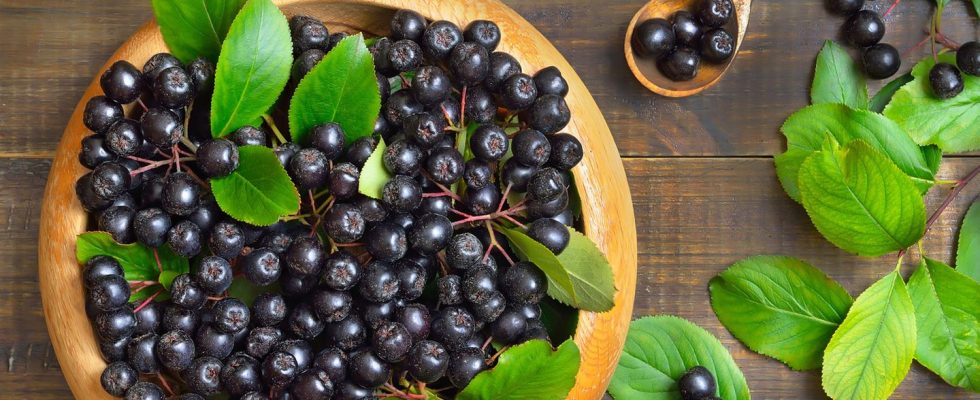Strengthen the immune system
With aronia into the winter – this berry is healthy for young and old
The healthy aronia berries can be enjoyed fresh, dried and made into juice or jam
© Nadezhda_Nesterova/Getty Images
Aronia berries owe their popularity to their ingredients: many vitamins and antioxidants that are supposed to protect our cells. Children also like the fruit as a juice or spritzer.
Anyone who bites into an aronia berry for the first time and expects the sweetness of a blueberry due to its dark purple color will probably grimace a little. Due to its high tannic acid content, the berry has a tart, sour taste and is therefore more suitable for processing than for fresh consumption.
Dried in muesli or processed into juice and – depending on your preference – extended into a spritzer, the fruit also tastes good to children. For people with a sensitive stomach, tolerance is often better if they consume dried aronia berries or pure aronia juice with or after a meal, reports the consumer advice center.
So what makes the aronia berry so healthy?
On the one hand, there are important ones Vitamins: The fruits contain vitamin C, vitamin B9, vitamin B2, vitamin K and provitamin A. A deficiency of vitamin B9, for example, more commonly known as folic acid, can lead to cardiovascular diseases or hardening of the arteries.
The fruit is best known for its secondary plant substances, which are associated with a number of health-promoting properties. While creams can only act on the skin cells from the outside, the “black chokeberry”, which is rich in flavonoids and phenolic acids, gets into the body. There, anthocyanins bind, among other things, harmful free radicals. “Compared to other local berries as well as the tropical acai and goji berries”, writes the Federal Center for Nutrition“aronia has an above-average anthocyanidin content, which is only surpassed by the local elderberry. No wonder then that the berry is traded as a superfood.”
However, if you are looking for meaningful studies on people that could prove individual health effects, you will hardly find them: the sparse studies have been carried out primarily on cell cultures or animals. With its mix of very different nutrients, the berry still makes a contribution to a healthy diet. Another plus: Aronia is now also grown in Germany, which leads to significantly shorter transport routes compared to other superfoods.
Give me my daily Aronia today? Yes. Depending on their age, however, different amounts of juice are recommended for children; adults can get by with 100ml per day. The juice also tastes good in hot tea. And: Other red fruits are also good sources of vitamins and antioxidants, although usually to a slightly lesser extent.
Sources:Consumer advice center, Wikipedia


